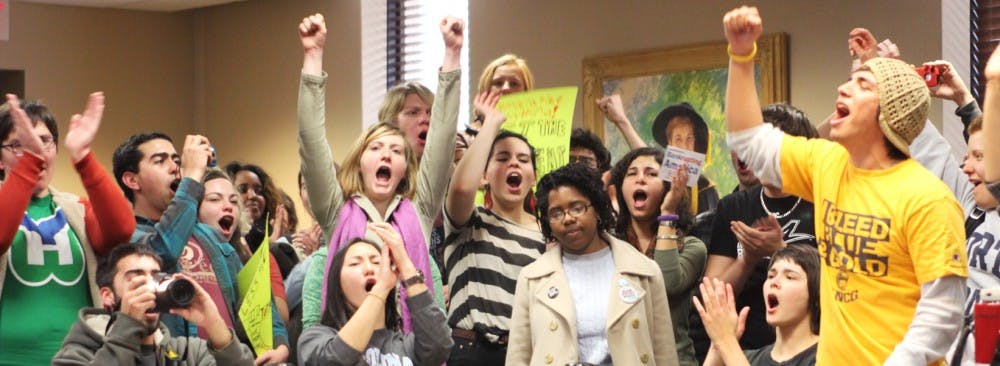Financial Aid
The board voted against an amendment proposed by board member Frank Grainger to cap the amount of tuition revenue directed toward financial aid at 25 percent.
Some board members said they were against taking money from one student and giving it to another student in the form of financial aid, and they said a cap might contain the problem.
ASG President Atul Bhula spoke out against the amendment, along with student protesters who would sporadically stand up and chant protests during the meeting.
“It’s a disservice to our students to do this,” Bhula said about Grainger’s proposal.
Ross promised a review of financial aid and what sources the aid should come from in the coming months.
UNC-CH puts 38 percent of its tuition revenue toward financial aid.
Shirley Ort, associate provost and director of scholarship and student aid at the University, said if need-based aid had been capped at 25 percent last year, 4,000 of the 13,000 students wouldn’t have received tuition grants.
“A 25 percent cap for us would be a setback in fulfilling our goals of providing 100 percent of documented need-based aid and holding down the debt our students face at graduation,” said UNC-CH’s Executive Vice Chancellor and Provost Bruce Carney.
At Thursday’s meeting, some board members were skeptical about approving a tuition proposal that spans two years instead of one, but Ross’ proposal passed unamended.
“Our campuses needed some help, and that’s what we tried to do today,” Ross said in a press conference. “The hope is that two years from now, we’ll know exactly what the anticipated needs (of the campuses) are.”
Staunching the bleeding
The UNC system suffered a budget cut of $414 million last year, and Ross said the tuition increase proposal — if approved by the N.C. General Assembly this summer — will put a “band-aid on the bleeding.”
To get the day's news and headlines in your inbox each morning, sign up for our email newsletters.
“If you look at the undergraduate amounts here, this tuition proposal produces just over 10 percent of what we lost last year. So it’s not going to fill the hole.”
Ross also said the board must continue to look at alternate sources of funding.
“One of the things that has been hard over the years are the cuts,” chairwoman of the board Hannah Gage said. “We were in this endless cycle of just responding. We’ve had little time to just hit the pause button and think.”
Occupying the boardroom
After the meeting was over, protesters stormed into the boardroom and sat in the board members’ seats in sign of protest. Protesters threw board members’ name tags on the floor, and chants against tuition turned into those that harbored sentiments of the Occupy movement.
Board member Franklin McCain, one of the Greensboro Four who initiated the Greensboro sit-ins during the civil rights movement, was the only member of the board who stayed as the student protesters took over the boardroom.
“I have an interest in what the students are interested in,” McCain said. “Students have the opportunity to practice democracy.”
He said he wasn’t disappointed to see the rest of the board members leave through the back door of the boardroom.
“It’s a matter of individual conscience,” McCain said. “For me, this is the best way to listen to their interests.”
He also said it was an appropriate way to protest the hikes.
“If you want to get noticed, you have to get a little louder. I think that’s acceptable.”
But Gage said the protest reflected not only views on tuition, but on economic inequality in general.
“They were angry with me about the bank bailout, about Wall Street,” Gage said in a press conference. “This was not just a student protest on tuition. They were angry about the world.”
Student voice
Bhula said although the student protesters were against Ross’ plan that his association supported, he was proud of them.
“They represented their cause well,” he said. “There are so many students out there with different mindsets.”
“I think they need to do this at the General Assembly.”
Grace Anderson, a senior at Winston-Salem State University, said she slept overnight in the Campus Y in order to protest the tuition hikes.
“The people here who are supposed to stand up for us did not,” Anderson said. “I want to be optimistic and say they did listen, but they are so disconnected from us.”
Joseph Terrell, director of internal relations for Campus Y, who helped organize the sleepover, said the administration had not given students the opportunity to voice their opinions on tuition increases.
“If the students were heard today, it’s not because they were invited to be heard,” he said.
Terrell’s fellow member of Campus Y, Gregory Randolph echoed his sentiments.
“Students acted in the only way they could in this situation,” Randolph said. “No students inside the meeting were allowed to speak except for one, and he’s not even a voting member of the Board of Governors, so people inside the room may have felt that what students did today was obnoxious or over the top.”
“But I think they left us no other option.”
Senior writer Tarini Parti contributed to reporting.
Contact the State & National Editor at state@dailytarheel.com.



